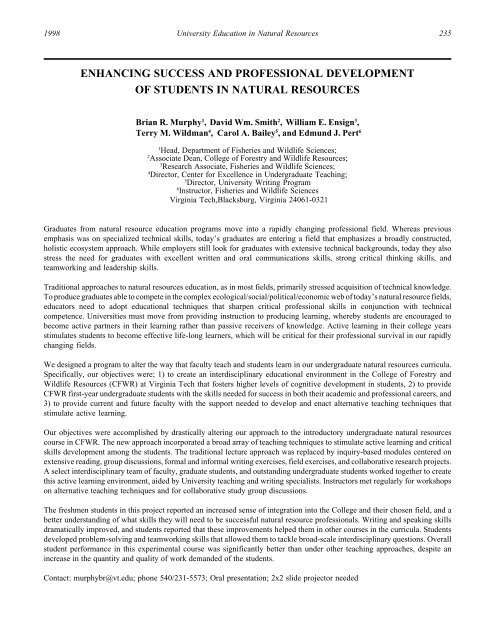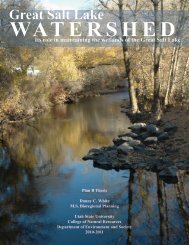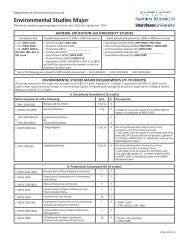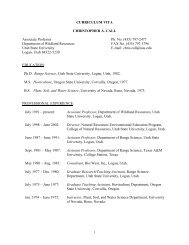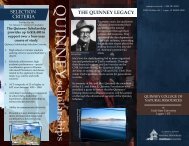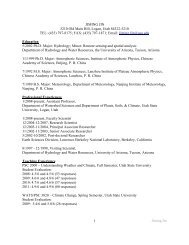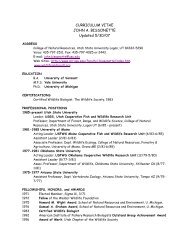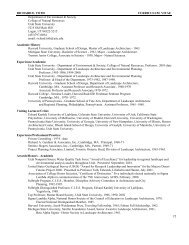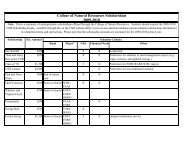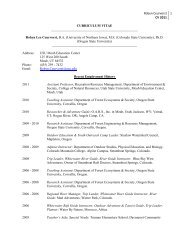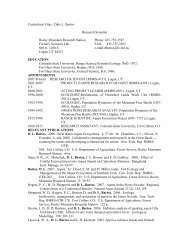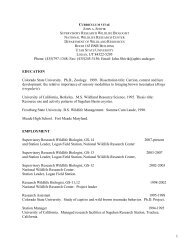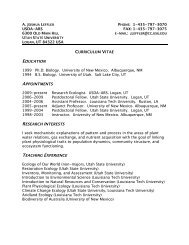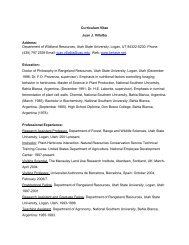University Education in Natural Resources - CNR Home - Utah State ...
University Education in Natural Resources - CNR Home - Utah State ...
University Education in Natural Resources - CNR Home - Utah State ...
Create successful ePaper yourself
Turn your PDF publications into a flip-book with our unique Google optimized e-Paper software.
1998<br />
<strong>University</strong> <strong>Education</strong> <strong>in</strong> <strong>Natural</strong> <strong>Resources</strong> 235<br />
ENHANCING SUCCESS AND PROFESSIONAL DEVELOPMENT<br />
OF STUDENTS IN NATURAL RESOURCES<br />
Brian R. Murphy 1 , David Wm. Smith 2 , William E. Ensign 3 ,<br />
Terry M. Wildman 4 , Carol A. Bailey 5 , and Edmund J. Pert 6<br />
1<br />
Head, Department of Fisheries and Wildlife Sciences;<br />
2<br />
Associate Dean, College of Forestry and Wildlife <strong>Resources</strong>;<br />
3<br />
Research Associate, Fisheries and Wildlife Sciences;<br />
4<br />
Director, Center for Excellence <strong>in</strong> Undergraduate Teach<strong>in</strong>g;<br />
5<br />
Director, <strong>University</strong> Writ<strong>in</strong>g Program<br />
6<br />
Instructor, Fisheries and Wildlife Sciences<br />
Virg<strong>in</strong>ia Tech,Blacksburg, Virg<strong>in</strong>ia 24061-0321<br />
Graduates from natural resource education programs move <strong>in</strong>to a rapidly chang<strong>in</strong>g professional field. Whereas previous<br />
emphasis was on specialized technical skills, today’s graduates are enter<strong>in</strong>g a field that emphasizes a broadly constructed,<br />
holistic ecosystem approach. While employers still look for graduates with extensive technical backgrounds, today they also<br />
stress the need for graduates with excellent written and oral communications skills, strong critical th<strong>in</strong>k<strong>in</strong>g skills, and<br />
teamwork<strong>in</strong>g and leadership skills.<br />
Traditional approaches to natural resources education, as <strong>in</strong> most fields, primarily stressed acquisition of technical knowledge.<br />
To produce graduates able to compete <strong>in</strong> the complex ecological/social/political/economic web of today’s natural resource fields,<br />
educators need to adopt educational techniques that sharpen critical professional skills <strong>in</strong> conjunction with technical<br />
competence. Universities must move from provid<strong>in</strong>g <strong>in</strong>struction to produc<strong>in</strong>g learn<strong>in</strong>g, whereby students are encouraged to<br />
become active partners <strong>in</strong> their learn<strong>in</strong>g rather than passive receivers of knowledge. Active learn<strong>in</strong>g <strong>in</strong> their college years<br />
stimulates students to become effective life-long learners, which will be critical for their professional survival <strong>in</strong> our rapidly<br />
chang<strong>in</strong>g fields.<br />
We designed a program to alter the way that faculty teach and students learn <strong>in</strong> our undergraduate natural resources curricula.<br />
Specifically, our objectives were; 1) to create an <strong>in</strong>terdiscipl<strong>in</strong>ary educational environment <strong>in</strong> the College of Forestry and<br />
Wildlife <strong>Resources</strong> (CFWR) at Virg<strong>in</strong>ia Tech that fosters higher levels of cognitive development <strong>in</strong> students, 2) to provide<br />
CFWR first-year undergraduate students with the skills needed for success <strong>in</strong> both their academic and professional careers, and<br />
3) to provide current and future faculty with the support needed to develop and enact alternative teach<strong>in</strong>g techniques that<br />
stimulate active learn<strong>in</strong>g.<br />
Our objectives were accomplished by drastically alter<strong>in</strong>g our approach to the <strong>in</strong>troductory undergraduate natural resources<br />
course <strong>in</strong> CFWR. The new approach <strong>in</strong>corporated a broad array of teach<strong>in</strong>g techniques to stimulate active learn<strong>in</strong>g and critical<br />
skills development among the students. The traditional lecture approach was replaced by <strong>in</strong>quiry-based modules centered on<br />
extensive read<strong>in</strong>g, group discussions, formal and <strong>in</strong>formal writ<strong>in</strong>g exercises, field exercises, and collaborative research projects.<br />
A select <strong>in</strong>terdiscipl<strong>in</strong>ary team of faculty, graduate students, and outstand<strong>in</strong>g undergraduate students worked together to create<br />
this active learn<strong>in</strong>g environment, aided by <strong>University</strong> teach<strong>in</strong>g and writ<strong>in</strong>g specialists. Instructors met regularly for workshops<br />
on alternative teach<strong>in</strong>g techniques and for collaborative study group discussions.<br />
The freshmen students <strong>in</strong> this project reported an <strong>in</strong>creased sense of <strong>in</strong>tegration <strong>in</strong>to the College and their chosen field, and a<br />
better understand<strong>in</strong>g of what skills they will need to be successful natural resource professionals. Writ<strong>in</strong>g and speak<strong>in</strong>g skills<br />
dramatically improved, and students reported that these improvements helped them <strong>in</strong> other courses <strong>in</strong> the curricula. Students<br />
developed problem-solv<strong>in</strong>g and teamwork<strong>in</strong>g skills that allowed them to tackle broad-scale <strong>in</strong>terdiscipl<strong>in</strong>ary questions. Overall<br />
student performance <strong>in</strong> this experimental course was significantly better than under other teach<strong>in</strong>g approaches, despite an<br />
<strong>in</strong>crease <strong>in</strong> the quantity and quality of work demanded of the students.<br />
Contact: murphybr@vt.edu; phone 540/231-5573; Oral presentation; 2x2 slide projector needed


